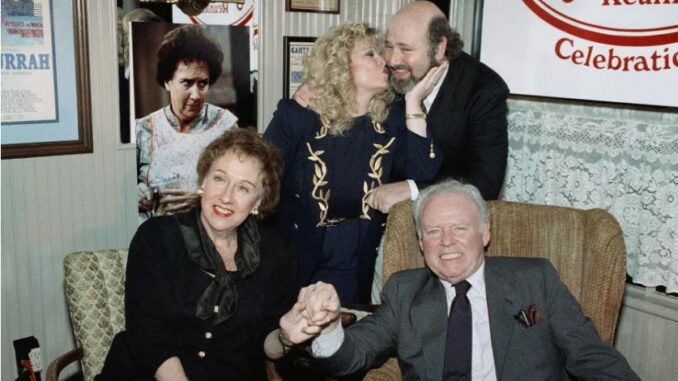The Show That Revolutionized Television Forever

“All in the Family” was the first show to truly engage with the cultural upheaval of 1960s America, forever changing the landscape of television. When CBS first aired “All in the Family” on January 12, 1971, it marked a turning point. Despite a rocky start in its first season, the show quickly rose to prominence, securing the No. 1 spot in the ratings for five consecutive years—a record at the time. The show captured national attention in a way that’s hard to imagine in today’s fragmented entertainment world. Archie Bunker’s catchphrases—“stifle,” “meathead,” and “dingbat”—became part of the national lexicon. Scholars debated whether the show challenged or reinforced bigotry.

“All in the Family” not only paved the way for other iconic comedies like “The Mary Tyler Moore Show” and “MAS*H” but also proved that television could provide meaningful social commentary—something networks had shied away from during the tumultuous 1960s. This legacy, the idea that TV could reflect and critique society, lives on in shows as diverse as “Fleabag,” “Atlanta,” “Breaking Bad,” and “The Wire.” The debut of “All in the Family” was the first step toward the Peak TV era we enjoy today.

“All in the Family” distilled the 1960s “generation gap” into a single living room, featuring Mike Stivic, a long-haired liberal, and his wife Gloria, clashing with Gloria’s father, Archie Bunker, a reactionary bigot and Nixon-loving dockworker, while Edith, the kindly but ditzy wife and mother, looked on. With a stellar cast and brilliant writing and directing, it became a landmark show, widely regarded as one of the greatest and most influential ever.
However, it was almost a miracle that “All in the Family” made it to air. ABC had rejected it twice before CBS picked it up. Earlier shows that tried to tackle social issues often failed, bogged down by good intentions that didn’t attract audiences. The success of “All in the Family” was largely due to two men: Norman Lear, its staunchly liberal creator, and Robert D. Wood, the conservative president of CBS, who put it on the schedule. Their collaboration revolutionized television, though neither seemed destined to do so.

Norman Lear’s background was far from glamorous. His father, Herman Lear, was a small-time salesman with numerous get-rich-quick schemes, while his mother, Jeanette, was self-absorbed and volatile. These tumultuous family dynamics provided the inspiration for Archie and Edith Bunker. Growing up in Connecticut and Brooklyn, Lear’s parents created an environment of barely controlled chaos. His father’s angry outbursts often included the command, “Jeanette, stifle yourself.”

Like many Depression-era children, Lear found direction in the military. After a few semesters at Emerson College, he enlisted in the Army Air Force following Pearl Harbor and flew bombing missions over Germany. Post-war, he worked as a Broadway press agent and for his father before making a pivotal decision: he moved his wife and daughter to Los Angeles in a 1946 Oldsmobile convertible, seeking a fresh start. Initially struggling, Lear sold furniture and baby photos door-to-door with Ed Simmons, an aspiring comedy writer married to Lear’s cousin.
“All in the Family” emerged from these humble beginnings to become a transformative force in television, proving that comedy could be both entertaining and socially relevant.
